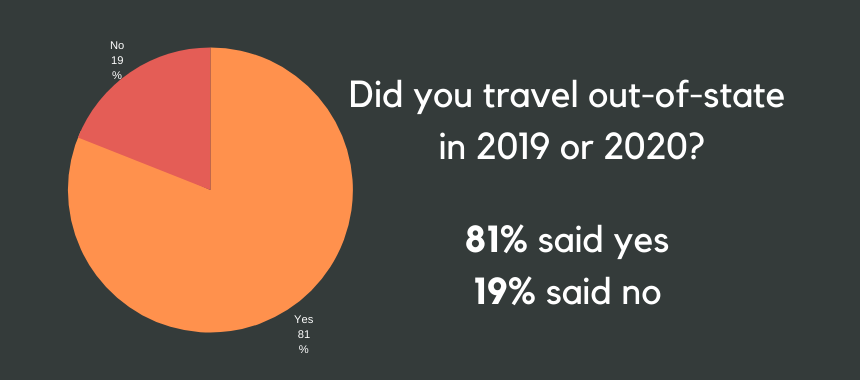You can make anything speech practice, as we learned a few weeks ago, which is why we dove into planning dream vacations during our recent aphasia chat. Some people told us about places they’ve been, others told us about places they’d like to go, and still others spoke about the joy of virtually traveling from the safety of your living room. We gathered up ideas for how to turn a love of travel into time to practice your speech.
Travel in the Past… and Future
We polled the participants of the chat to learn how many traveled out-of-state in 2019 or 2020. 81% of the participants had traveled in the last year and a half while 19% had not left their local area.

When we asked whether people would travel again after the pandemic was over, 64% said yes, 14% said no, and 21% were on the fence, wanting more information before making a decision. Comfort levels ranged in the group, from people who wanted to travel but discovered their family members were too nervous to join them, to people who missed grandchildren but knew it was safer to stay home.

In other words, travel was a popular activity before the pandemic, and it will likely be a popular activity after the pandemic. Which is why we thought it made a great topic for practicing speech.
Plan a Trip
Part of the joy (and headache) of travel is the planning stage. You’re imagining where you’ll go and what you’ll see when you get there. Set aside a half-hour today to research a place you’ve always wanted to go to. You can join with a conversation partner and plot out an itinerary, scheduling in activities and sightseeing.
Talk through the trip, imagining what it will be like to be in another place. This is a great on-going activity that can serve as a topic of conversation over many weeks. You and a conversation partner can meet regularly to share information you’ve found or activities you’d like to do.
Watch Virtual Travel Films
One participant pointed out that films about places or virtual tours often take you into places you can’t go if you’re actually in the space. She explored Detroit’s Hitsville U.S.A. Motown Museum via a Hulu movie.
We also rounded up plenty of places you could “go” and talk about during or afterward:
Travel Around the World in 30 Days
Pretend you’ve purchased a hot air balloon (a hot air balloon capable of even crossing the Atlantic Ocean!) and you’re going on a trip that keeps moving each day in one direction.
Choose a starting point and work your way around the globe, searching YouTube for videos or diving into the street view on Google Earth to explore a place. What do you notice while you’re there? Keep watching until you can speak or write ten words that make that place unique including landmarks (nouns), descriptive words (adjectives), or things you can do there (verbs).
Make sure you keep heading in the same direction around the globe. Keep a map handy and mark the places you go to. Can you get to every continent? See points in the far north and far south? Make sure you discuss each leg of your daily “trip” with a conversation partner; either in your home or via a video call.
Go on a Real Trip
While we’re not suggesting you get in a plane or even a car right now, there is plenty of “travel” that can happen in your neighborhood. One participant brought up geocaching. A quick search brings up over 5000 geocaches in my area, so I’m pretty sure there will be at least a few in yours.
Geocaching is a travel game that uses GPS coordinates and clues to send people to a “treasure” (usually a box that contains a notepad where you can sign your name and show you found the geocache). Letterboxing and waymarking are two similar activities.
All three activities include reading and speaking as part of the quest, plus you can describe everything you’re seeing for extra speech practice.
Camping also got two thumbs up during our call, and camping can take place in the backyard or some nearby parks or campgrounds. It has the added benefit over hotels as being easier to be socially distant while still getting out into the world. If you go camping, make sure you use the experience as a topic of conversation to practice your speech.
Describe everything you do and see.
Don’t Forget to Eat
So much of what makes travel fun is the sensory component: the sights and sounds and smells and tastes. While you’ve been able to recreate the sights and sounds with videos, don’t forget to make meals of dishes from around the world. Talk while you cook and describe the food while you eat. Food, we’ve always found during our aphasia chats, is a popular topic of conversation. Anything can become speech practice, and based on our very animated aphasia cafe last week, travel is an excellent topic for kicking off conversations.
Tell us what location you’d like to use to kick off some speech practice.



